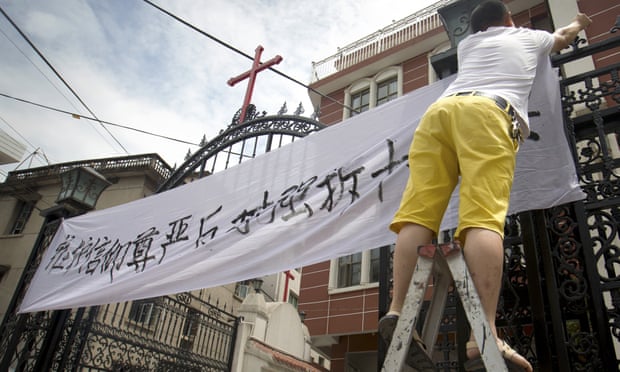Wednesday 23 December 2015 20.42 EST
■ Human rights activist Zhang Kai, who was fighting the Communist party’s removal of church crosses, was snatched four months ago by the authorities
Zhang Kai will not make it home for Christmas.
In late August, the Christian human rights lawyer was snatched in eastern Chinaas he prepared to denounce a Communist party cross-removal campaign to the United States ambassador-at-large for religious freedom.
He has not been seen since.
 |
| Church members put up a banner opposing the removal of crosses at a Catholic church in China’s Zhejiang province. Photograph: Mark Schiefelbein/AP |
“Nobody knows where he is. That is really something that is very hard,” said Yang Fenggang, a US-based academic and friend. “His family doesn’t know. His own lawyer doesn’t know … It is beyond understanding.”
In the years leading up to Zhang’s enforced disappearance, the 36-year-old lawyer had built a reputation as an uncompromising defender of China’s needy and poor.
A quick-tongued, Bible-carrying attorney, he made it his mission to stand up for the rights of earthquake victims, destitute migrant workers, landless farmers and women whose lives had been torn apart by the infamous one-child policy.
He used social media to denounce human rights abuses and racked up thousands of air miles, travelling as far as Tibet and Xinjiang to represent clients.
“[He] saw himself as a spokesperson for all of those who were suffering, all of those who were victims of the worst that contemporary China has produced for hundreds of millions of victims,” said Terry Halliday, a professor at the American Bar Foundation who has known the missing lawyer for almost a decade.
Zhang converted to Christianity, China’s fastest-growing faith, in 2003 and became an energetic critic of Beijing’s treatment of religious communities, including the underground “house church” movement to which he belonged.
“One might say he had emerged as the most prominent and persuasive spokesperson for house churches in China,” said Halliday.
That work, exhausting and at times dangerous, brought the Beijing-based lawyer into frequent contact with China’s violent underbelly: an underworld of threats, intimidation and torture often perpetrated by agents of the state.
In 2009, during a work trip to the southwestern city of Chongqing, Zhang reported being viciously beaten by police after he tried to investigate the suspicious death of a practitioner of the banned spiritual movement Falun Gong at a Chinese prison camp.
The following year, a convoy of cars without number plates filled with unidentified men pursued him through the streets of Beijing, leaving the lawyer badly shaken.
Exhausted, Zhang sought a temporary respite, and in 2013 he enrolled for a year at Indiana’s Purdue University.
Yang, a Purdue sociologist who helped arrange the sabbatical, said his friend used his time to organise a conference on religious freedom, where Christian leaders and lawyers gathered to debate the plight of China’s church.
But Zhang also “spent part of the time just relaxing and recovering”, he added. “He did some sightseeing, travelling around. He needed that.”
Zhang visited Washington DC, New York, Boston and Maine during his gap year from the punishing travails of life as a human rights lawyer in a one-party state.
But last year, as a Communist party cross-removal campaign gained pace in the eastern province of Zhejiang, he decided it was time to return home.
“It’s more exciting to be in China,” he told Yang. “Life in the US is too easy – there’s no excitement.”
Chinese Christians are still grappling with the significance of the cross-removal campaign, which activists say has affected more than 1,200 churchessince it began in late 2013.
Some believe it is the result of an overzealous politician’s personal vendetta against the church in Wenzhou, a city known as “China’s Jerusalem” for its large Christian population.
Many more, however, fear it is part of a deliberate and coordinated campaign that has the blessing of the country’s top leaders and is designed to slow Christianity’s growth.
As evidence of Beijing’s support, they point to president Xi Jinping’s ties to Zhejiang – where he was governor and party chief from 2003 to 2007 – and the recent promotion of key officials linked to the campaign.
Halliday said Zhang had become increasingly fearful for the church’s position in China and believed the situation had deteriorated since Xi became leader in late 2012. “He definitely saw a turn since Xi Jinping came to power,” he said.
In October 2014, as the anti-church campaign escalated, Zhang relocated to Zhejiang to offer legal support to congregations battling to save their crosses.
On one occasion, he camped outside a detention centre where Huang Yizi, a pastor who had been jailed for protesting against the cross removals, was being held.
More than 100 Zhejiang churches enlisted Zhang’s help as government officials continued to strip crosses from their places of worship.
Then, friends say, the Communist party decided it had had enough. “He became too difficult to be handled normally so they decided to take some extraordinary measures,” said Yang.
On 25 August, the day before Zhang was due to meet David Saperstein, the US ambassador-at-large for religious freedom, the Chinese lawyer was spirited into custody by police.
Speaking in October, Saperstein described Zhang’s detention as “deeply discouraging”.
“We have continued to ask questions, we will continue on this and we hope that we will get answers [from Beijing],” he told reporters.
Nearly four months after he vanished, there has been no news from Zhang Kai, who has a wife and baby daughter.
“I have no reason to be optimistic [that he will be home for Christmas],” said Zhang Lei, a lawyer who has represented the missing attorney.
Some fear Zhang’s connections to churches in the US could see him charged with spying.
“If that is the case, at the extreme it might involve the death penalty, [or] at the very least a very long sentence,” said Halliday.
Halliday, who last saw Zhang in June, described his friend’s disappearance and the destruction of crosses as “part of a much larger drama for the survival of the one-party state in China”.
Beijing saw church leaders and Christian lawyers as potential threats to the Communist party’s grip on power that had to be dealt with, he said.
Yang said China’s economic might meant international criticism over Zhang’s disappearance had been muted and fruitless. “It seems the whole world is powerless in dealing with this situation,” he said.
Halliday said his friend would look to God for support during his continued incarceration. “I would expect that he will be drawing deep on his reserves of belief, that he will be praying the kinds of pleas that you read about in the psalms,” he said. “Desperate pleas for mercy, for freedom.”
Additional reporting Christy Yao
China Aid Contacts
Rachel Ritchie, English Media Director
Cell: (432) 553-1080 | Office: 1+ (888) 889-7757 | Other: (432) 689-6985
Email: [email protected]
Website: www.chinaaid.org
